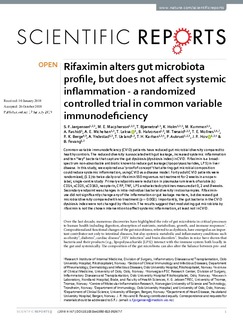Rifaximin alters gut microbiota profile, but does not affect systemic inflammation - a randomized controlled trial in common variable immunodeficiency
Jørgensen, Silje Fjellgård; Macpherson, Magnhild Eide; Bjørnetrø, Tonje; Holm, Kristian; Kummen, Martin; Rashidi, Azita; Michelsen, Annika; Lekva, Tove; Halvorsen, Bente; Trøseid, Marius; Mollnes, Tom Eirik; Berge, Rolf Kristian; Yndestad, Arne; Ueland, Thor; Karlsen, Tom Hemming; Aukrust, Pål; Hov, Johannes Espolin Roksund; Fevang, Børre
Journal article, Peer reviewed
Published version

Åpne
Permanent lenke
http://hdl.handle.net/11250/2607454Utgivelsesdato
2019Metadata
Vis full innførselSamlinger
Sammendrag
Common variable immunodeficiency (CVID) patients have reduced gut microbial diversity compared to healthy controls. The reduced diversity is associated with gut leakage, increased systemic inflammation and ten “key” bacteria that capture the gut dysbiosis (dysbiosis index) in CVID. Rifaximin is a broad-spectrum non-absorbable antibiotic known to reduce gut leakage (lipopolysaccharides, LPS) in liver disease. In this study, we explored as a ‘proof of concept’ that altering gut microbial composition could reduce systemic inflammation, using CVID as a disease model. Forty adult CVID patients were randomized, (1:1) to twice-daily oral rifaximin 550 mg versus no treatment for 2 weeks in an open-label, single-centre study. Primary endpoints were reduction in plasma/serum levels of soluble (s) CD14, sCD25, sCD163, neopterin, CRP, TNF, LPS and selected cytokines measured at 0, 2 and 8 weeks. Secondary endpoint was changes in intra-individual bacterial diversity in stool samples. Rifaximin-use did not significantly change any of the inflammation or gut leakage markers, but decreased gut microbial diversity compared with no treatment (p = 0.002). Importantly, the gut bacteria in the CVID dysbiosis index were not changed by rifaximin. The results suggest that modulating gut microbiota by rifaximin is not the chosen intervention to affect systemic inflammation, at least not in CVID.
